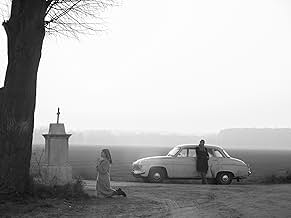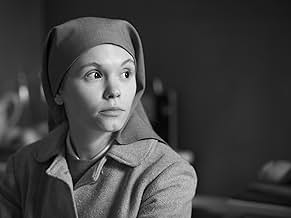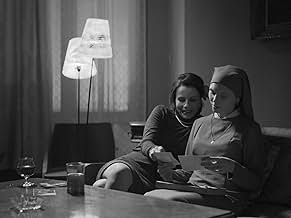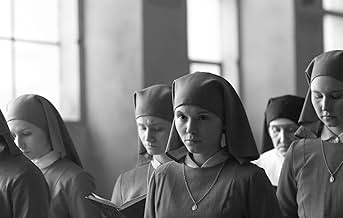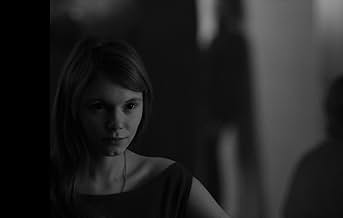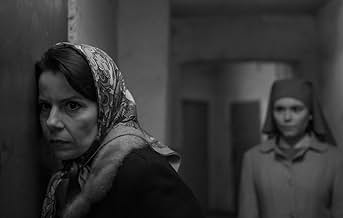IMDb-BEWERTUNG
7,4/10
62.230
IHRE BEWERTUNG
Anna, eine junge Novizin im Polen der 1960er-Jahre, steht kurz vor der Ablegung ihrer Gelübde, als sie ein dunkles Familiengeheimnis aus der Zeit der Nazibesetzung entdeckt.Anna, eine junge Novizin im Polen der 1960er-Jahre, steht kurz vor der Ablegung ihrer Gelübde, als sie ein dunkles Familiengeheimnis aus der Zeit der Nazibesetzung entdeckt.Anna, eine junge Novizin im Polen der 1960er-Jahre, steht kurz vor der Ablegung ihrer Gelübde, als sie ein dunkles Familiengeheimnis aus der Zeit der Nazibesetzung entdeckt.
- Regie
- Drehbuch
- Hauptbesetzung
- 1 Oscar gewonnen
- 70 Gewinne & 92 Nominierungen insgesamt
Natalia Lange
- Bronia
- (as Natalia Lagiewczyk)
Jan Wojciech Poradowski
- Father Andrew
- (as Jan Wociech Poradowski)
Empfohlene Bewertungen
Ida was a dark somber tragic story expressed perfectly in film.
I am not a big fan of black and white "art" movies done for effect, except the old black and white movies, but Ida was filmed so perfectly, and the stark black and white was so integral to the story and feeling of the movie it was really perfect.
I am not a big fan of jazz either, but again, the choice of Coltrane's jazz music for parts of this film really let you feel what jazz is all about, it was beautiful.
The story was of an orphan nun who is preparing to take her final vows to God. The Mother Superior calls her in and tells her about who she is. Ida grew up not knowing her name or anything about her family. Ida finds that she has an aunt nearby and is told to go to see her before taking her vows.
The slow, heavy and deliberate pace of the movie express the story so perfectly, and there is no pandering or cheap shots, the movie is beautifully done. This is a story that is not for everyone, or every time, but I am glad it was made and that I saw it.
I have to give it a 10/10 for pure craftsmanship and cinematic perfection.
I am not a big fan of black and white "art" movies done for effect, except the old black and white movies, but Ida was filmed so perfectly, and the stark black and white was so integral to the story and feeling of the movie it was really perfect.
I am not a big fan of jazz either, but again, the choice of Coltrane's jazz music for parts of this film really let you feel what jazz is all about, it was beautiful.
The story was of an orphan nun who is preparing to take her final vows to God. The Mother Superior calls her in and tells her about who she is. Ida grew up not knowing her name or anything about her family. Ida finds that she has an aunt nearby and is told to go to see her before taking her vows.
The slow, heavy and deliberate pace of the movie express the story so perfectly, and there is no pandering or cheap shots, the movie is beautifully done. This is a story that is not for everyone, or every time, but I am glad it was made and that I saw it.
I have to give it a 10/10 for pure craftsmanship and cinematic perfection.
Ida is the small and simple story of a complex and terrible past that gets unearthed when a nun discovers she is Jewish. Before taking her vows, she is sent out to meet her aunt, a bitter woman who drinks too much from the life and miserable aftermath of a Nazi occupied Poland. They journey in search of Ida's murdered parents and their resting place and what unfolds is simple, raw storytelling and plotting that is never overly grim, overly dramatic or hits a false note. Beautifully shot in black and white and with a short 80 minute running time that doesn't allow a moment of fat in this narrative, Ida is a rewarding experience.
Whereas Jacques Rivette's despairing 'La Religieuse' had been shot in incongruously pretty sixties Eastmancolor, this laconic but wryly good-humoured female road movie - like Ingmar Bergman's Persona' - gains much of it's seductive visual impact from being shot in coolly glacial monochrome that looks like what you'd have got if Vermeer had worked in charcoal.
Similarly, like the Scandinavian good looks of Liv Ullman and Bibi Andersson in Bergman's film, 'Ida' is fascinating to watch throughout simply for the strong Polish features of Agata Kulesza as the chain-smoking 'Red Wanda' and the button eyes of Agata Trzebuchowska in the title role.
Similarly, like the Scandinavian good looks of Liv Ullman and Bibi Andersson in Bergman's film, 'Ida' is fascinating to watch throughout simply for the strong Polish features of Agata Kulesza as the chain-smoking 'Red Wanda' and the button eyes of Agata Trzebuchowska in the title role.
Greetings again from the darkness. Writer/director Pawel Pawlikowski films in his homeland of Poland and presents a familiar topic from a most unusual perspective. This film has been very well received on the festival circuit and it's easy to see why: it's beautifully photographed, very well acted, includes terrific music and presents an emotional story for intelligent viewers.
We first meet Anna as a novitiate nun on the verge of taking her vows. Her Mother Superior has one requirement. Anna must visit her lone surviving relative. Her Aunt Wanda is everything Anna is not: worldly, cynical, direct. In the first few minutes of their visit, Wanda (Agata Kulesza) informs Anna (Agata Trzebuchowska) that she was born Jewish with the name Ida, and she was sent to a Catholic orphanage when her parents were killed.
After this bombshell, the two set out on a journey to discover the truth and trace their roots. It's a journey of discovery not just for Ida, but also for Wanda, who carries her own burden. Questioning one's faith and one's true identity is nothing new, but this makes for quite an unusual buddy road trip. Wanda is rarely without a drink in hand and Ida has had no previous exposure to the real world.
This is the debut of Agata Trzebuchowska and her porcelain look and big eyes convey a quality with which we find ourselves comfortable with, while Ms. Kulesza evokes empathy from the viewer despite her harsh edge and beaten down outlook on life and people. Hers is a standout performance.
Two exceptional pieces of music are used to perfection: Coltraine's "Naima" and Mozart's "Jupiter" symphony. The storytelling and look of the film might be austere (stunning black and white photography) but this music hits us hard in two separate scenes.
We first meet Anna as a novitiate nun on the verge of taking her vows. Her Mother Superior has one requirement. Anna must visit her lone surviving relative. Her Aunt Wanda is everything Anna is not: worldly, cynical, direct. In the first few minutes of their visit, Wanda (Agata Kulesza) informs Anna (Agata Trzebuchowska) that she was born Jewish with the name Ida, and she was sent to a Catholic orphanage when her parents were killed.
After this bombshell, the two set out on a journey to discover the truth and trace their roots. It's a journey of discovery not just for Ida, but also for Wanda, who carries her own burden. Questioning one's faith and one's true identity is nothing new, but this makes for quite an unusual buddy road trip. Wanda is rarely without a drink in hand and Ida has had no previous exposure to the real world.
This is the debut of Agata Trzebuchowska and her porcelain look and big eyes convey a quality with which we find ourselves comfortable with, while Ms. Kulesza evokes empathy from the viewer despite her harsh edge and beaten down outlook on life and people. Hers is a standout performance.
Two exceptional pieces of music are used to perfection: Coltraine's "Naima" and Mozart's "Jupiter" symphony. The storytelling and look of the film might be austere (stunning black and white photography) but this music hits us hard in two separate scenes.
10Red-125
Ida (2013) is a Polish film co-written and directed by Pawel Pawlikowski. This brilliant film follows a few days in the life of Anna, a young novitiate nun. Anna has been raised in a convent, and she plans to take her vows and stay in the convent for the rest of her life.
However, before this can take place, the mother superior sends her to meet her only living relative, a woman named Wanda.
The pair could not be less similar. Ida is quiet, gentle, thoughtful, and shy. Her aunt is tough as nails--she has real power as a judge, and she knows how to use it. She's a heavy drinker and a heavy smoker. She's also a Jew.
In the first few minutes of the movie, Anna learns that she's Jewish. As a very young girl, she was taken to the convent, where the nuns raised her. (Her real name is Ida, which is why that's the title of the film.)
Wanda and Anna set out to return to their rural home, to solve the mystery of what happened to their family 20 years earlier. Why did Ida survive, when her family--other than Wanda--did not?
This film, shot in black & white, is superbly constructed on every dimension. The plot is tight, and the acting is incredible. Agata Kulesza (Wanda) and Agata Trzebuchowska (Anna/Ida), are immensely talented actors.
The cinematography is incomparable. My wife and I felt as if any frame--from the beginning to the end of the movie--would make a great still photograph.
Pawlikowski knows how to focus on his main actors, but he also lets us know that, while the protagonists are involved in heartbreaking drama, the rest of the world is going about its business around them.
This is a grim film. Anna's life is restricted by her piety. Wanda's life is constricted by alcohol and--it would appear--by lack of any close personal relationships. Everyone in Poland is restricted by horrible memories, dark secrets, and Soviet domination.
Grim or not, this is a film you shouldn't pass up if you care about great cinema. We saw it on a large screen at the LittleTheatre in Rochester, NY. However, it will work well enough on DVD. Don't miss it.
However, before this can take place, the mother superior sends her to meet her only living relative, a woman named Wanda.
The pair could not be less similar. Ida is quiet, gentle, thoughtful, and shy. Her aunt is tough as nails--she has real power as a judge, and she knows how to use it. She's a heavy drinker and a heavy smoker. She's also a Jew.
In the first few minutes of the movie, Anna learns that she's Jewish. As a very young girl, she was taken to the convent, where the nuns raised her. (Her real name is Ida, which is why that's the title of the film.)
Wanda and Anna set out to return to their rural home, to solve the mystery of what happened to their family 20 years earlier. Why did Ida survive, when her family--other than Wanda--did not?
This film, shot in black & white, is superbly constructed on every dimension. The plot is tight, and the acting is incredible. Agata Kulesza (Wanda) and Agata Trzebuchowska (Anna/Ida), are immensely talented actors.
The cinematography is incomparable. My wife and I felt as if any frame--from the beginning to the end of the movie--would make a great still photograph.
Pawlikowski knows how to focus on his main actors, but he also lets us know that, while the protagonists are involved in heartbreaking drama, the rest of the world is going about its business around them.
This is a grim film. Anna's life is restricted by her piety. Wanda's life is constricted by alcohol and--it would appear--by lack of any close personal relationships. Everyone in Poland is restricted by horrible memories, dark secrets, and Soviet domination.
Grim or not, this is a film you shouldn't pass up if you care about great cinema. We saw it on a large screen at the LittleTheatre in Rochester, NY. However, it will work well enough on DVD. Don't miss it.
Wusstest du schon
- WissenswertesPawel Pawlikowski had such difficulty finding an actress to play the titular character that he asked his friends to take secret photographs if they saw anyone who was in the right ballpark of the character. One of his friends, director Malgorzata Szumowska, saw Agata Trzebuchowska in a Warsaw café, took the picture and persuaded her to audition. She agreed to meet with Pawlikowski because she was a fan of his film My Summer of Love (2004).
- PatzerWhen Ida is in a church, the priest seems to be getting ready to say Mass and we see a versus populum altar, which didn't become the norm until years later after Vatican II. The movie takes place in 1961 and the priest would have been saying Mass on the high altar.
- VerbindungenFeatured in 72nd Golden Globe Awards (2015)
- SoundtracksSerduszko puka w rytmie cha-cha
Music by Romuald Zylinski
Lyrics by Janusz Odrowaz-Wisniewski
Performed by Maria Koterbska
Top-Auswahl
Melde dich zum Bewerten an und greife auf die Watchlist für personalisierte Empfehlungen zu.
- How long is Ida?Powered by Alexa
Details
Box Office
- Budget
- 1.000.000 $ (geschätzt)
- Bruttoertrag in den USA und Kanada
- 3.827.060 $
- Eröffnungswochenende in den USA und in Kanada
- 55.438 $
- 4. Mai 2014
- Weltweiter Bruttoertrag
- 11.156.836 $
- Laufzeit1 Stunde 22 Minuten
- Farbe
- Sound-Mix
- Seitenverhältnis
- 1.37 : 1
Zu dieser Seite beitragen
Bearbeitung vorschlagen oder fehlenden Inhalt hinzufügen




